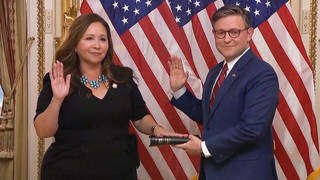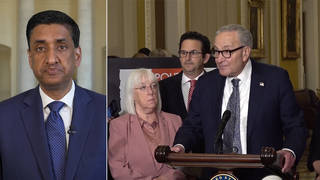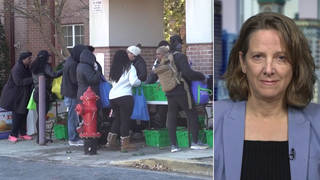
Guests
- Blanche Wiesen Cookauthor of the award-winning best-seller Eleanor Roosevelt, Vol. 1: 1884-1933, and the most recent Vol. 2: 1933-1938, published by Viking Press, speaking from Boston.
Yesterday, we spoke with author Blanche Wiesen Cook, who has written two volumes on Eleanor Roosevelt, the most well-known first lady in American history. Hillary Clinton, who continues her four-day “listening tour” through central New York state as part of her bid for a seat in the Senate, often says that Eleanor Roosevelt is one of her models. Aside from having a philandering husband, she has also been deeply involved in politics. Today, Part 2 of a discussion on Eleanor Roosevelt — and her own work on poverty in the U.S.
Transcript
AMY GOODMAN: You’re listening to Pacifica Radio’s Democracy Now! I’m Amy Goodman.
Today we’ve been talking about poverty, as President Clinton is making his swing through some of the poorest areas of the United States. And it’s a no more appropriate time than to once again bring up the issue of Eleanor Roosevelt. She is mentioned quite a lot these days, as Hillary Clinton is in the news with her most likely run for a Senate seat in New York, because she cites Eleanor Roosevelt as a model for her.
We’re joined now by the feminist historian Blanche Wiesen Cook, who has written two volumes on Eleanor Roosevelt. The latest one has just come out, Eleanor Roosevelt, Vol. 2: 1933-1938.
Again, welcome to Democracy Now!, Blanche.
BLANCHE WIESEN COOK: Thanks, Amy. It’s really good to be here. And I’m so glad to be here to talk about poverty and this tour that President Clinton is making, in terms of Eleanor Roosevelt, because it really strikes me that Eleanor Roosevelt is really one of the last people in America to talk about housing security. And I really want to make a pitch for this community called Arthurdale that Eleanor Roosevelt had so much to do to create, as we face an issue that nobody is talking about. There are 7 to 9 million homeless Americans. And nobody is — there has not been one single federal dollar invested in new housing since Ronald Reagan.
And, you know, it’s sort of interesting. Eleanor Roosevelt was orphaned at 10. And her whole life, she lived in other people’s houses. It fascinates me as a biographer that the first thing she did as first lady was to say, “I want everybody to live in really decent housing, affordable housing, and housing security is what America should stand for, along with health security and education security and job security.” And she went around — she was told by a man named Clarence Pickett, who was head of the American Friends Service Committee, “If you want to see how really desperate things are in Depression America, come on down here to West Virginia, where people are living in caves and culverts.” And this is an area where there were miners who had been blacklisted because they were unionists and had tried to start a union. They were called reds. They had been unemployed since the 1920s. By the 1930s, they were in desperate states, literally dying and starving and living in caves above a sewer called Scotts Run. And Eleanor Roosevelt wanted these people to live in really nice houses, two to five acres, indoor toilets, indoor bathtubs, a window in every room, really lovely homes.
This project was ridiculed by historians, biographers, pundits, the press, even members of FDR’s own Cabinet. Historically, it hasn’t gotten any good press, until I went down there. I went down here with Clare Coss, my partner, and we looked around. We talked to the people. This is really a model of what could be, if we were serious about a life of dignity and decency for all people. The original settlers are still there, their children, their grandchildren. Nobody moves away. And these homes are cozy, in an area in the Appalachian Mountains that gets down to about 40 degrees below zero in the winter.
And Harold Ickes, the father of this Harold Ickes, wrote to FDR, saying, “Do you know what your wife is doing down there? She’s spending money like a drunken sailor. If Eleanor Roosevelt has her way, how are we going to tell the rich from the poor?” And Eleanor Roosevelt said, “Well, in matters of such simple dignity and decency, we should not have to tell the rich from the poor.”
And this is a vision, Amy, that we really need to reconsider today as we contemplate the fact that there are 7 to 9 million homeless Americans withering and suffering on the streets of our cities and villages throughout this country.
AMY GOODMAN: Well, Blanche Wiesen Cook, it’s another interesting ironic parallel between the two times and who is in office and who’s in power and who isn’t, is here was Harold Ickes complaining to Eleanor Roosevelt’s husband, the president of the United States, and now we have Harold Ickes’ son, who is running the campaign or close adviser to Hillary Rodham Clinton, if she runs for Senate in New York.
BLANCHE WIESEN COOK: Well, you know, unlike a lot of people who feel very cynical about Hillary Rodham Clinton, I feel very open-hearted and want to hear what she’s going to do, because I’m very happy that she wants to model herself on Eleanor Roosevelt. You know, no other first lady has run for office. No other first lady has said, “I want to be like Eleanor Roosevelt. Eleanor, can you hear me?” And since she does, all I can hope is that this is for Hillary Rodham Clinton a declaration of independence. This is her separation agreement from the White House, and that she is going to take on these issues. We know that as a member of the Children’s Defense Fund, she really cares passionately about education. So, maybe we will see Hillary Rodham Clinton taking on these issues that Eleanor Roosevelt did take on so bluntly.
And Harold Ickes Jr., who follows perhaps in his father’s footsteps as a great antiracist, he was on the board of the NAACP. He was a friend of Jane Addams, the pioneer social worker, who indeed founded the NAACP with Mary White Ovington and W. E. B. Du Bois. I mean, these were important issues to that, one can say, parent generation. So, I feel a little bit open-hearted and willing to wait to see what she does.
AMY GOODMAN: Well, it will be interesting to see, Blanche Wiesen Cook, whether Hillary Clinton does distance herself or actually criticize President Clinton — for example, welfare reform, which was the greatest reform of welfare since it was put into place during — wasn’t it during FDR’s time?
BLANCHE WIESEN COOK: It was. You know, the shredding of the safety net is perhaps the worst thing that has happened since, you know — I mean, it really sets the social justice clock back really a hundred years. In the 1880s, Eleanor Roosevelt’s mentors — Jane Addams, Lilian Wolfe, Florence Kelley — really set the agenda not only for economic security, but for something called well baby clinics and nutritional information for mothers. And they had a great success in 1921, during a Republican administration, Harding. Warren Harding signed the legislation called Sheppard-Towner. And in 1921, Sheppard-Towner said, “We’re going to start a public health nursing service for mothers and children. We’re going to do prenatal care and prenatal education. We’re going to do well baby clinics.”
And this bill, Sheppard-Towner, which was a model that Eleanor Roosevelt was delighted to see, it was defunded in 1927, and Eleanor Roosevelt was outraged. She campaigned against this — I mean, she campaign for it, to keep it alive. It didn’t come up again until 1935 as part of the Social Security Act. And it came up in 1935 as part of the Social Security Act as women and children, women, infant — women and infant care, and it included — you know, it included Medicaid. It included well baby clinics. It included nutritional information. And because of the shredding of the safety net, there’s been a kind of war against single mothers, a kind of war against getting nutritional information and public health nursing services, that really should be available, and Medicaid.
And, you know, there’s a case in New York where a mother who was breastfeeding has been convicted of murder, because her baby died of starvation. And she went to her mother and said, “Look, I breastfeed, and the baby gets smaller and smaller.” And her mother said, “We’ll go to a doctor.” They went to a doctor. And the doctor said, “Well, you don’t have insurance, and you don’t have Medicaid. And that’s a four-month procedure.” And she didn’t get it, and the baby died at two months. Now, this is a tragedy that we know about because a jury has just convicted her. This could not happen if Sheppard-Towner were on the books. It could not happen if the safety net had not been shredded.
And as I said yesterday, you know, Eleanor Roosevelt was the only first lady to leap for her pen to criticize her husband’s policies. We didn’t hear a word about this terrible, tragic situation that exists today because of the shredding of the safety net and the deboning of welfare as we know it. In New York City, 40% of the children live below the poverty line, and we’re balancing the budget by cutting food stamps. And this isn’t the Great Depression. This is while we have — you know, we’re awash in money. We have a surplus of almost $2 billion in New York. So, Hillary Rodham Clinton, if she wants to be in Eleanor Roosevelt’s footsteps, really has a very specific agenda to carry on.
AMY GOODMAN: We’re talking to Blanche Wiesen Cook, who is a feminist historian, has written two volumes on Eleanor Roosevelt, the latest just to come out published by Viking Press. Now, yesterday we talked extensively about Eleanor Roosevelt and many issues — her commitment to fighting racism; her speaking out, as well, against her husband; why did FDR fail to promote the U.S. entrance into the World Court, even though Eleanor Roosevelt campaigned for it. We talked about her stand during World War II. We talked about her giving out The Crisis magazine, the NAACP’s magazine, to high government officials, her work with Mary McLeod Bethune. We talked a lot about her public work, which is the most important. But in your book, Blanche, you also talk about Eleanor Roosevelt’s private life. Now, she did say we all have to have a place for secrets and a private life. But it’s so interesting to see how Eleanor Roosevelt dealt with her husband, dealt with his philandering, something that certainly Hillary Rodham Clinton has to do in full view of the public. Can you talk about their private life and her private life?
BLANCHE WIESEN COOK: Well, I’d be really happy to, Amy. And a lot of people ask me, “Why does it matter” that Eleanor Roosevelt had really important relationships with Lorena Hickok and Earl Miller, who are, I think, among her closest companions and relationships? And I think it does matter, because Eleanor Roosevelt’s politics was fueled by love. Everything she did, she did for love of the people in her life and love of the world. And, you know, love is an experiential reality. It’s not an abstraction. So it seems to me very important to look at her relationships with the people that she did love.
And there’s her incredible partnership with FDR, which I have to say is, in some ways, a much warmer and freer relationship than any we have ever seen since, because FDR, you know, really said, “The whole world knows I can’t silence you. You just go out and do whatever you have to do on domestic issues. And if you can warm an issue up, then I’ll run with it.” And this relationship, the core relationship of this political partnership, is — you know, it’s built on trust and respect, and, indeed, love.
And I think that Eleanor Roosevelt really lived with a hole in her heart, where FDR’s great romance had been after his first affair with Lucy Mercer, which she discovered in 1918. And then, after 1920, Missy LeHand becomes a permanent fixture in the Roosevelt household. She is his secretary companion. And Eleanor Roosevelt treats her as the second wife, the junior wife. I was very amused, in the first volume, when I first read a marvelous article that Eleanor Roosevelt had written in 1923 called “The Women of Tibet.” She said, “It has been brought to my attention that the women of Tibet have several husbands, which seems to me a very good thing, since so many husbands have so many wives.”
And if you look at the White House, I said yesterday Eleanor Roosevelt was a very competitive woman. There’s her court, his court. He has four intimate friends for dinner; she has four intimate friends for dinner. He has Missy LeHand and other people living in the White House; Eleanor Roosevelt has Lorena Hickok and other people living in the White House. And this, you know, sort of competitive spirit fuels a lot of things.
And then, her relationship with Lorena Hickok, which is a very important one and the most abiding relationship of her and absorbing relationship of her middle years — Hick says to Eleanor Roosevelt, “You know, you’re sending me all these 10-, 20-page letters. The whole world wants to know what you do during your day.” And that becomes the origins of her “My Day” column. And Eleanor Roosevelt gets a lot of strength from her relationship with Lorena Hickok, and a lot of power. She learns a lot from Lorena Hickok. You know, Eleanor Roosevelt becomes a very important and significant journalist. And she learns how to write her columns —
AMY GOODMAN: Blanche, explain who Hickok is.
BLANCHE WIESEN COOK: Lorena Hickok was the highest-paid political reporter who was a woman during the 1920s and '30s. She is assigned to cover the election of 1932. She's not assigned to cover Eleanor Roosevelt, because she’s — you know, she’s not a women’s page woman. She’s the really strong, tough political reporter. And she notices that Eleanor Roosevelt is unhappy. And she’s intrigued by Eleanor Roosevelt. And over time, as I describe in volume one, they become really very close to each other. I think there is — there’s no question that it’s a romantic and passionate friendship. I choose not to characterize it, but it’s very clear to me that the letters mean exactly what they say. People say, “Well, these are Victorian letters.” But, of course, they’re not Victorian. They’re not Edwardian. They’re very modern letters. And they’re written by women who are both journalists, who always are accustomed to writing exactly what they mean to say. So, when Eleanor Roosevelt writes to Hick, “I can’t wait to lie down beside you and take you in my arms,” I don’t have any reason to believe that doesn’t mean exactly what it says.
AMY GOODMAN: Blanche Wiesen Cook, I hate to end it there, but we are out of time. We are going to come back later, in the next few weeks to Eleanor Roosevelt. Blanche Wiesen Cook, feminist historian, author of the second volume of her two-volume set, just out, Eleanor Roosevelt. It’s published by Viking Press.
And that does it for today’s program. If you’d like to order a cassette copy, call 1-800-735-0230. That’s 1-800-735-0230. Special thanks to Tom Casey, station manager at KILI Radio on the Pine Ridge Reservation. And tomorrow we’ll be broadcasting live from Seattle, Unity '99, the gathering of more than 6,000 journalists of color. George W. Bush Jr. is in Seattle. He will not be addressing the group. I'll be there with Juan González, so do stay tuned. Democracy Now! produced by María Carrión and David Love. Errol Maitland, our technical director. I’m Amy Goodman. Thanks for listening.












Media Options